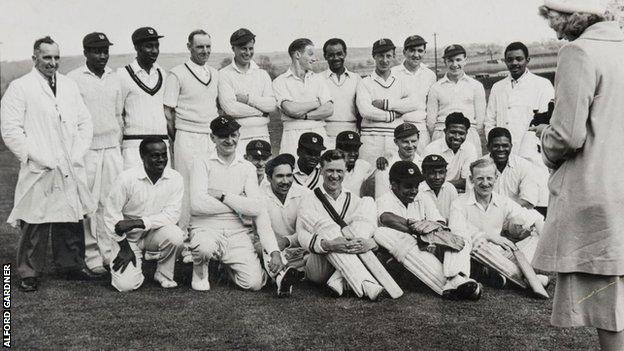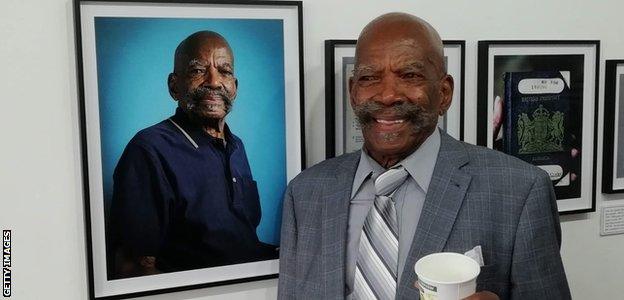Caribbean Cricket Club, Leeds: How cricket helped Windrush migrants 'integrate'
- Published

The Caribbean Cricket Club team after a match in Yorkshire
When Alford Gardner stepped off the Empire Windrush - a ship bringing about 500 migrants to the UK from the Caribbean - he, like his fellow passengers, was about to embark on a storied journey: one that would see him build a life for himself in a land more than 4,000 miles from home.
Jamaica, where Alford was from, and Leeds, where Alford was to settle, couldn't have been more different in 1948.
Yet there was one thing which was central to the life of people in both places - cricket.
Within months of arriving in the UK, the country's first Caribbean Cricket Club had been formed.
"It was 1948, there were just eight West Indians in Leeds and they needed something to do, something to help integrate them into the community… so they set up a cricket club," says Howard Gardner, Alford's son.
Now, 72 years later, the Caribbean Cricket Club in Leeds is home to three adult teams and four junior teams, welcoming men and women, boys and girls, from all backgrounds.
It all might have been so different if a racist shop worker of the day had his way.
"There was a big cricket shop in Leeds which my father and his friends arranged to get equipment from so they could play," said Howard.
"Everything was agreed - they would take bats, balls, stumps etc on a hire purchase agreement - but when they went to collect the equipment, they were told they couldn't have it.
"They had to resort to borrowing equipment from elsewhere. Unfortunately, discrimination like that was common back then."
When they did manage to source equipment, every waking hour was spent playing cricket on long summer days.
"When I grew up in Jamaica, everyone played for a cricket team," says Alford, now 94.
"We'd spend all weekend down at the cricket club, and the boys and girls would be scattered around the boundary playing a mini Test match of their own.
"It was the highlight of our week. We carried that on in Leeds and other Yorkshire towns and cities."
Bowlers were fast - "there was no such thing as medium", says Alford - and batters hit the ball hard. But most of all, everyone was welcome - "we had a lad from St Kitts called Crossley who was brilliant… we didn't bother with first names in those days, just the name they went by for the scorecard".
Former West Indies Test players Stuart Williams and Corey Collymore have turned out for the side since, and the groundsman has a particular brief - to make West Indian-style decks which are fast, bouncy and promote "cross bat rather than straight bat cricket"., external

Alford Gardner served in the RAF during the Second World War, and settled in Leeds after arriving on Windrush because he had studied engineering there
And, as is happening this summer, when the West Indies tour the UK, there is more reason than ever to celebrate. Alford recalls the pride he felt when the tourists beat England 3-1 in 1950, two years after Windrush.
"I vividly remember dashing to Nottingham on the train and watching West Indies beat England by 10 wickets," says Alford, who married a local girl, Norma McKenna, with whom he raised eight children.
"The radio commentary of that time will always stay with me - hearing names like Everton Weekes, Clyde Walcott and Frank Worrell come to life."
It became the norm for the touring West Indians to have a night out at a social club in Emley, near Huddersfield, with Alford and his team-mates in future years, and the pride in the maroon cap remains.
The success of Jason Holder's team on their current tour of England is cheering Alford, while the 'Blackwash' 5-0 success of 1984 will forever be treasured.
"I can understand why the West Indies fans called it blackwash," said ex-West Indies bowler Michael Holding recently, in a powerful Sky Sports programme discussing the Black Lives Matter movement.
"What came home to me, when I started to meet West Indians who lived here and began to understand what they went through in this country, was what it meant to win.
"I can understand them saying 'what is whitewash, why has everything good got to be white? Let's call it blackwash'. I was happy they could identify with something and call it what they wanted."
And while the world is a very different place to the one Alford and his fellow Windrush passengers encountered in 1948, one simple fact remains - that cricket can still be an important vehicle for integration.
The very club which Alford helped to set up continues to expand and at its core is a focus on equality and anti-racism.
All of that while helping to bring a little bit of the Caribbean - whether that be food, drink or fast bowling - to a little corner of west Yorkshire.
To think all of this might not have happened if the club's founders had given up when faced with discrimination in a cricket shop 72 years ago.

Watch Sitting in Limbo, a shocking drama inspired by the Windrush scandal.
Last chance to watch: England v West Indies classics - 2000, Lord's & 1995, Old Trafford
